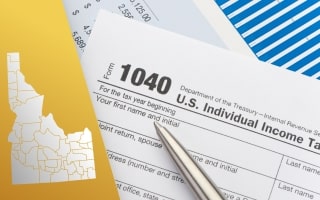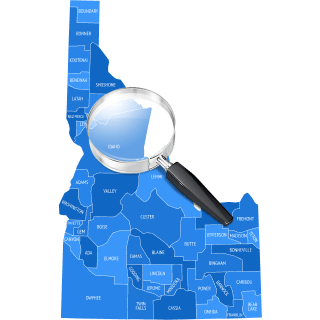Property Tax Records in Idaho

In Idaho, all homeowners receive an annual property tax bill. Currently, the average tax rate in Idaho is around 0.65%, which is well below the national average but not as low as in states like Hawaii, Alabama, and Colorado.
While property tax rates in Idaho are generally low, the specific rate you pay when you become a homeowner depends on the county you live in. Counties set property tax rates, not the state itself. These rates can increase or decrease based on how much money the county needs to collect. Even if the tax rate doesn't change, the amount you owe every year can vary.
Your property taxes in Idaho are based on the assessed value of your home. If the market value or assessed value increases, your property taxes will likely go up. In Idaho, there's no legal limit to how much an Idaho property tax bill can rise. However, counties are only allowed to increase the portion of the budget that's paid for with property taxes by 3% every year.
When you receive a property tax notice in the mail, you'll need to pay it to your county's tax assessor. In most counties, homeowners can choose to pay their taxes in a single lump sum or two installments. The first payment is always due by December 20. If you choose to pay in installments, you must pay the remainder of your taxes by June 20.
While these taxes have been collected for decades in Idaho, information about properties and the taxes allotted to them weren't always publicly available. Idaho enacted a public records law in 1990, which means that the Idaho State Tax Commission is required to fulfill requests for these documents.
Property Tax Assessment in Idaho

If you're trying to calculate how much you owe in property taxes for the year, the amount depends on the assessed value of your home. Property taxes in Idaho are generally low because of the homestead exemption that most people have access to. However, your home's assessed value can be high.
Before your home's assessed value can be determined, your county's tax assessor must identify its market value. In many states, the assessed value is often around 50%-80% of the market value. However, a home's assessed value in Idaho is based on its total market value. Keep in mind that market value is determined by factors like the condition of your home and the size of it.
Let's say you own a home that has a market value of $250,000. The assessed value will also be $250,000. If you qualify for a homestead exemption, the assessed value might decrease. If your home's assessed value is reduced by $125,000, you'll only owe property taxes on $125,000. If the tax rate in your county is .60%, your tax bill will likely amount to $750.
Before buying real estate in Idaho, keep in mind that property tax rates are typically higher in urban areas than in rural ones. The average tax rates in the most populous Idaho counties are:
- Ada County: 0.80%
- Kootenai County: 0.64%
- Canyon County: 0.85%
- Bonneville County: 0.82%
- Twin Falls County: 1.09%
As you can see, property tax rates in Idaho can vary greatly, and if you're planning on moving to Idaho, you should keep the average tax rates in mind.
Calculate Idaho Taxes
Using an Idaho property tax calculator is a smart way to understand how property taxes are calculated in the state. This tool helps both homeowners and real estate investors estimate their tax assessment and annual liability by entering key property details such as location, market value, and applicable exemptions.
An Idaho property tax calculator offers a clearer picture of your annual tax responsibilities and can help identify available exemptions and tax relief programs, such as the Homeowner’s Exemption, which reduces the taxable value of an owner-occupied primary residence by up to $125,000 or 50% of the home’s value, whichever is less. Other programs include the Property Tax Reduction (Circuit Breaker) Program for seniors, people with disabilities, and certain veterans, offering income-based tax relief.
using our property tax calculator.
Idaho Property Tax Records: What Are They?

Every county in Idaho sets property tax rates by creating a budget that covers all public services. A portion of the budget is funded by the property taxes that the assessor collects. In most counties, Idaho property taxes are used to pay for important community services like roads, schools, parks, and public safety. Places like Boise, which is in Ada County, will also use some of this money to fund the following services and institutions:
-
Fire department
-
Parks and recreation
-
The Library
-
Police department
Nearly all homes and properties in Idaho are taxed. The only properties that are exempt from taxation include ones that are owned by the United States or the state of Idaho. The same is true of properties that belong to a federally recognized Indian tribe.
If you're getting ready to buy a home and want to learn more about the property, you can find a considerable amount of information in tax records. Every property in Idaho has tax records that the public can gain access to. This information can help you determine if you're making a wise investment.
Once you find the tax assessor's website and enter an address or parcel ID for a specific property, you'll be able to view a lot of details about the home. For example, the first thing you should notice is a photo of the home. Most properties also come with interactive maps of the surrounding area. You can even read the latest tax assessment notice. The many types of information that are listed on a property tax record include the following:
-
Owner name
-
Address
-
Subdivision
-
Zone code
-
Total acres
-
Comprehensive valuation details, including assessed value
-
Tax district
-
Annual taxes
-
Status of tax payments
-
Delinquencies
-
Property sketch
-
Land characteristics
-
Square footage
-
Number of bedrooms and bathrooms
-
Year built
Property Tax Exemptions and Deductions in Idaho

Whether you live in Ada County or Twin Falls County, you'll be able to apply for exemptions that can reduce your property taxes. Like most states, exemptions in Idaho usually lower your property taxes by reducing your home's assessed value. With Ada County property tax rates higher than average, it would be wise to apply for an exemption.
While individual counties may offer a couple of their exemptions, the state provides a deduction that applies to all counties. Let's say that your home is located in Ada County. You may qualify for the Homestead Exemption and the Homeowner's Tax Relief Program.
Homestead Exemption: If you own a home that you consider your primary residence, you may qualify for a Homestead Exemption. This exemption allows the current value of your property and as much as one acre of land to be exempted at 50% of the total assessed value. Keep in mind that the maximum exemption is $125,000.
Homeowner's Tax Relief Program: This program is newly available as a result of House Bill 2929, which was passed by the Idaho State Legislature in 2023. This program designated around 4.5% of revenue from the state sales tax for property tax relief. You'll notice it as a line item on your property tax bill.
How To Search Property Tax Records in Idaho

There are a few ways to find tax information on properties in Idaho. Regardless of where you live, each county tax assessor in Idaho provides the public with online access to these records. All tax records are stored in a database that you should be able to access through the tax assessor's website.
Every database allows you to search for a property with parameters like address, parcel, or subdivision. You can also search for partial information, which will yield multiple results that may help you find what you're looking for.
While you can get a lot of information from the records available through the county tax assessor's website, numerous third-party tools provide these services. For example, PropertyChecker.com allows you to search for tax records and additional information about a property.
When using PropertyChecker, you can search for a property based on parameters like address, owner's name, owner's phone, or parcel ID. Once you perform this search, you'll gain access to many of the public records for this property, which include the following:
-
Details about other residents
-
Building permits
-
Lien records
-
Foreclosures
-
Property Values
-
Property details
-
Neighborhood information
-
Deeds
-
Purchase history
-
Loan records
-
Property owners
How To Appeal Property Taxes in Idaho

When you get your annual property tax bill in the mail, you may be surprised at the number you see on the page. Property taxes can increase by a sizable amount even if you haven't taken any steps to improve the value of your home over the past year.
In this scenario, you can file an appeal in the county where you live. If the appeal is successful, the assessed value of your home will be lowered. Luckily for you, an Idaho property tax appeal isn't too complicated. Use this step-by-step guide to understand how the appeals process works and what you need to do to win your case.
Step 1: Wait to receive your property tax notice, which should be mailed to you by the 4th Monday in November. Make sure you have a copy of last year's bill for comparison.
Step 2: Idaho residents often pay property taxes in two installments, the latter of which occurs on June 20th of the following year. If you choose to file an appeal on your property taxes, you must do so by the 4th Monday of June. Submit your appeal form with your county's Board of Equalization.
Step 3: Once the Board of Equalization receives your appeal, they'll set a hearing. During this hearing, you must show evidence that the assessed value of your property is too high. These hearings are often short. You may either receive the Board's decision in person or by mail within a couple of weeks.
Step 4: If your county's Board of Equalization doesn't reduce the assessed value of your home, you can appeal their decision with the county auditor. The auditor will then submit this document to the Idaho Board of State Tax Appeals. Before you file the Property Tax Assessment Appeal Form, make sure you're aware of the requirements.
Step 5: If you appeal the BOE decision, you must do so within 30 days. Keep in mind that you may need to pay a filing fee to get a hearing.
How Property Tax Records Impact Real Estate Transactions in Idaho

While the average property tax rate in Idaho is around 0.65%, it's closer to 1% in some counties, which means that taxes can impact real estate transactions. Sellers and buyers alike need to consider property taxes when attempting to complete a transaction.
If you're selling a home in a county with a high property tax rate, buyers may be wary about purchasing a high-cost property if they believe that taxes will substantially increase the amount they pay each month. Sellers in counties with high property taxes can make their homes more appealing by reducing listing prices or offering to pay for closing costs.
When investing in Idaho real estate, property taxes determine how much profit you earn from your rental unit. Low property taxes allow you to obtain a higher cash flow and increase your profits, which you can then use to bolster your investment portfolio. Before you buy a piece of real estate in Idaho, verify that the title doesn't have any liens on it.
While many different types of liens can be placed on a home, the most common is a property tax lien. When a homeowner doesn't pay their property taxes, the county can eventually put a lien on their title, which means that they will get paid once the property is sold. If the owner falls too far behind with their taxes and mortgage payments, the home may be foreclosed on. Properties with delinquent taxes are usually sold at public auctions.
Each county in Idaho has different guidelines for how and when delinquent tax sales are held. For example, property tax sales in Kootenai County occur once per year.
A secondary tax sale may be held if any properties weren't sold in the first auction. If you invest in real estate via a public auction, you'll only receive ownership of the property if you pay all delinquent taxes on the day of the sale.
Free Idaho Property Tax Lookup
Tax Records Please wait...
Property Tax Guide
- Property Tax Records in Idaho
- Property Tax Assessment in Idaho
- Idaho Property Tax Records: What Are They?
- Property Tax Exemptions and Deductions in Idaho
- How To Search Property Tax Records in Idaho
- How To Appeal Property Taxes in Idaho
- How Property Tax Records Impact Real Estate Transactions in Idaho
Instant Access to Idaho Property Records
- Owner(s)
- Deed Records
- Loans & Liens
- Values
- Taxes
- Building Permits
- Purchase History
- Property Details
- And More!
Free Idaho Property Tax Lookup
Tax Records Please wait...
Property Tax Guide
- Property Tax Records in Idaho
- Property Tax Assessment in Idaho
- Idaho Property Tax Records: What Are They?
- Property Tax Exemptions and Deductions in Idaho
- How To Search Property Tax Records in Idaho
- How To Appeal Property Taxes in Idaho
- How Property Tax Records Impact Real Estate Transactions in Idaho